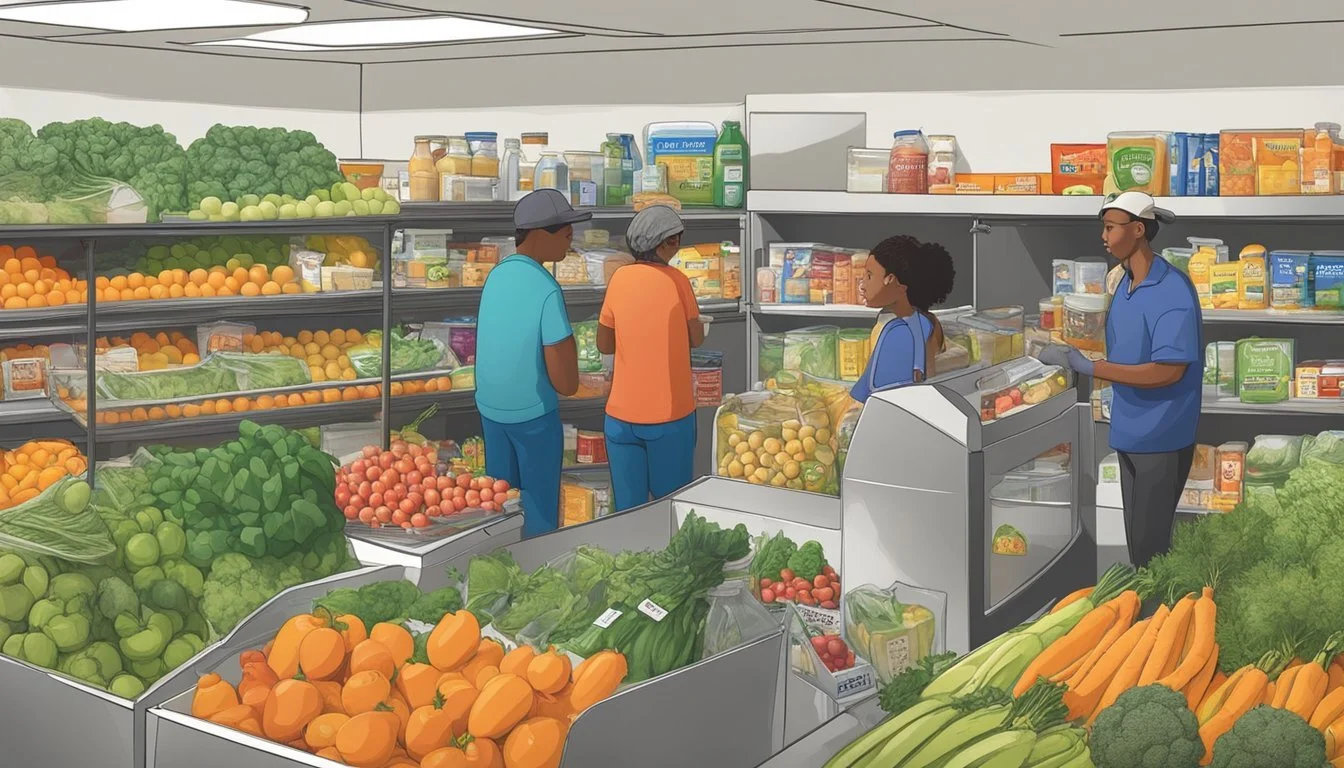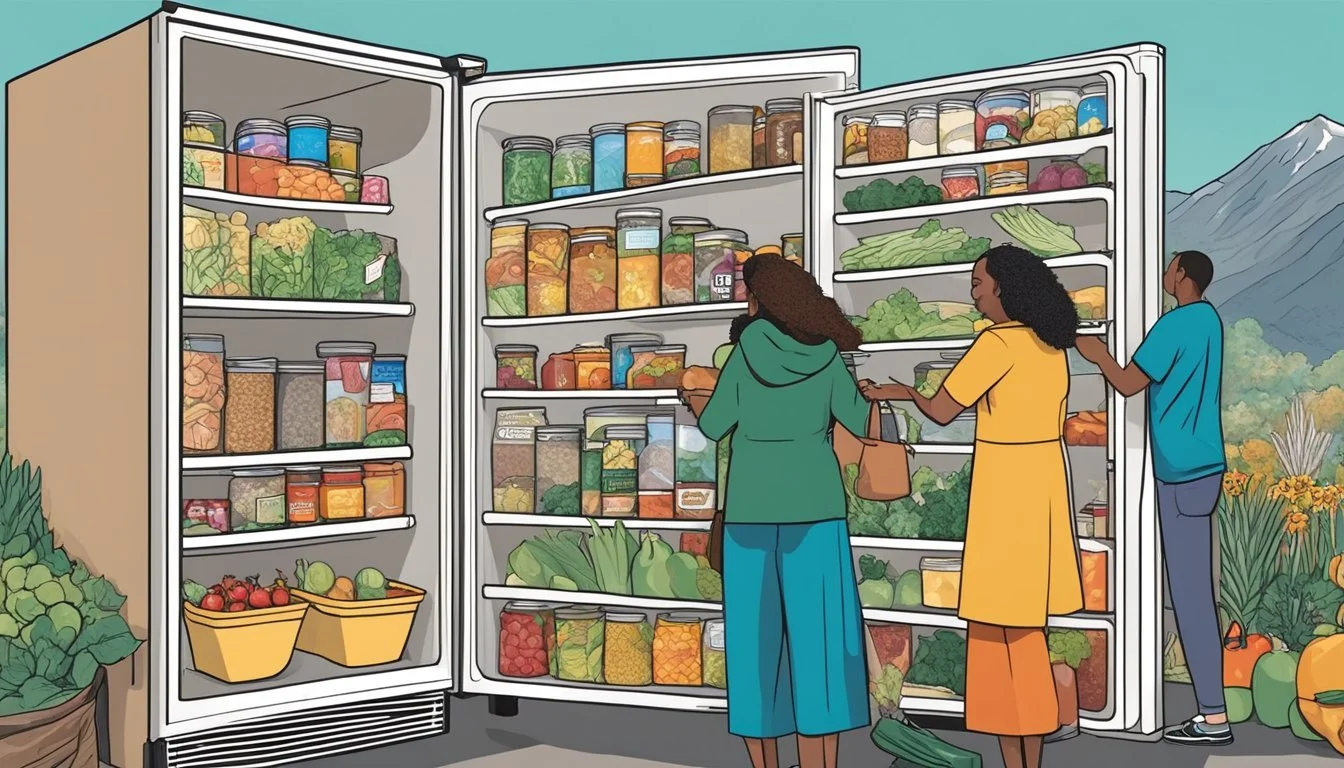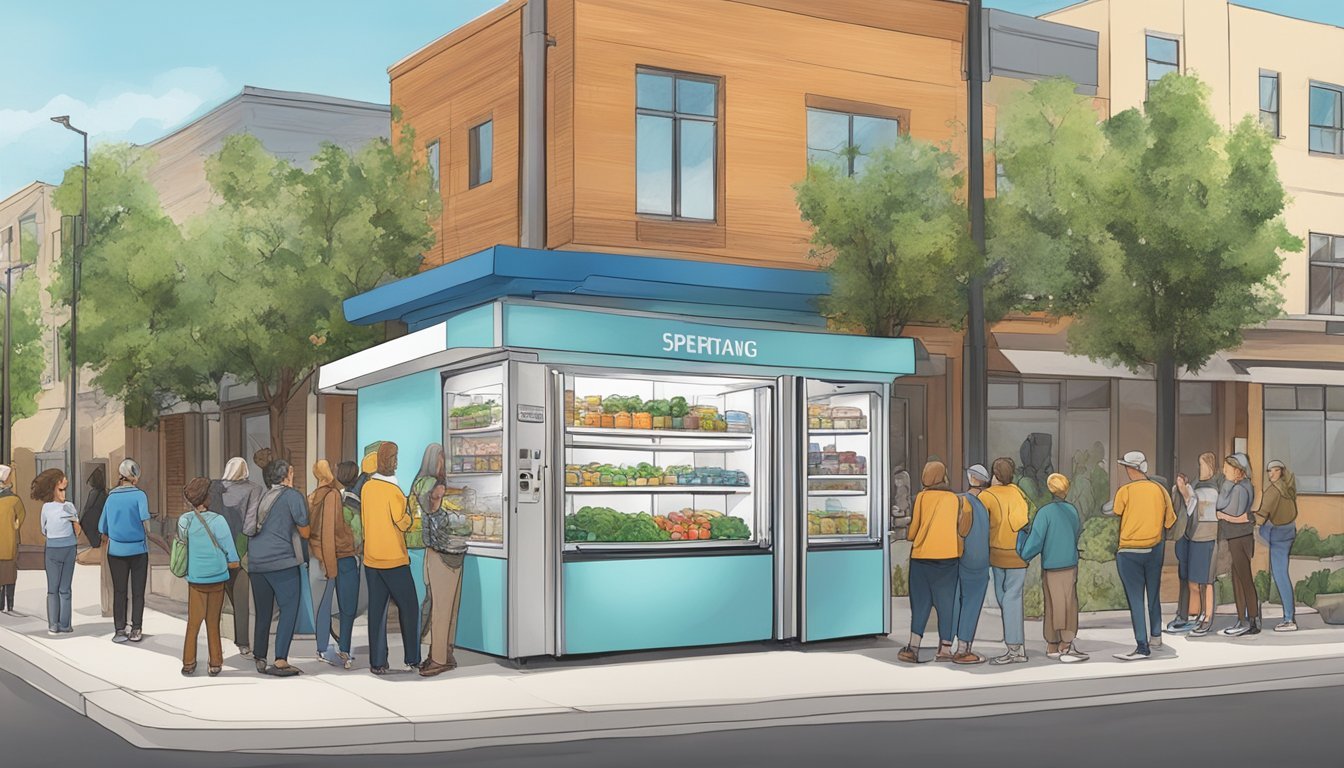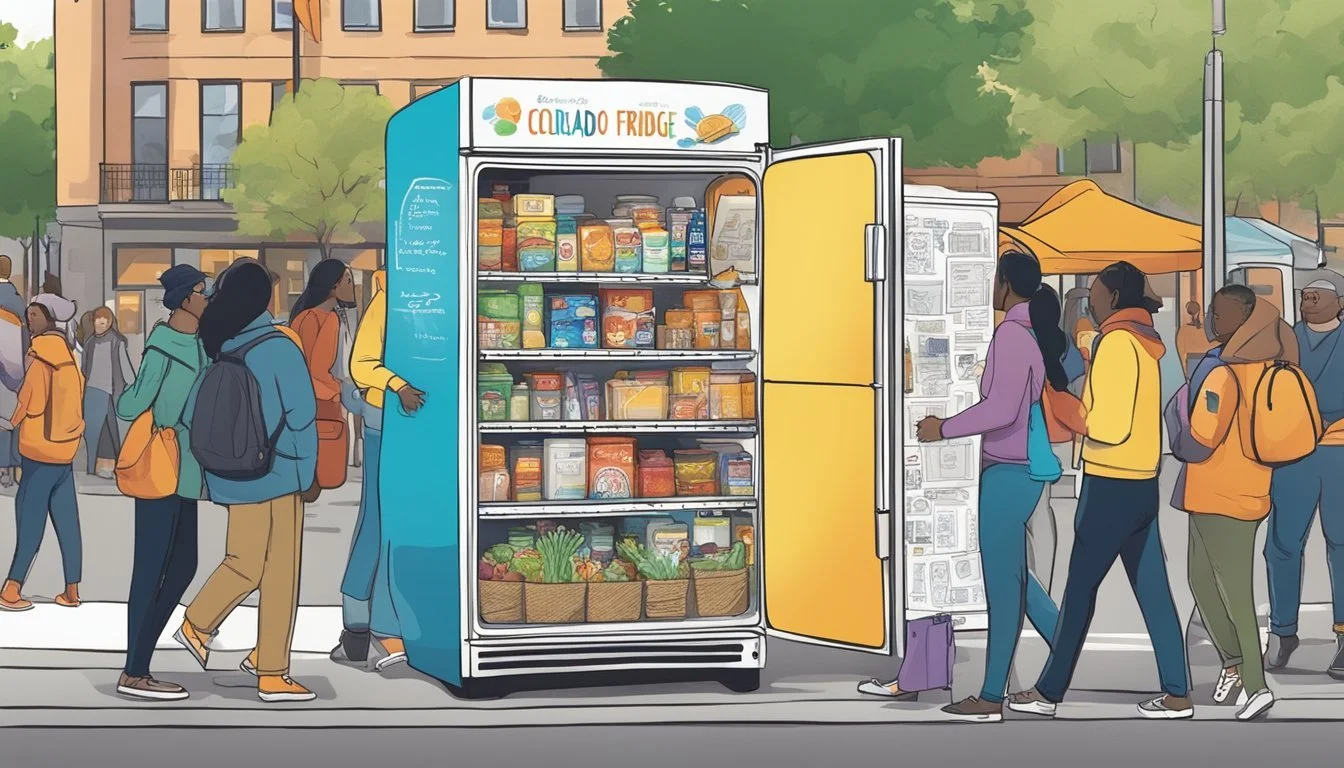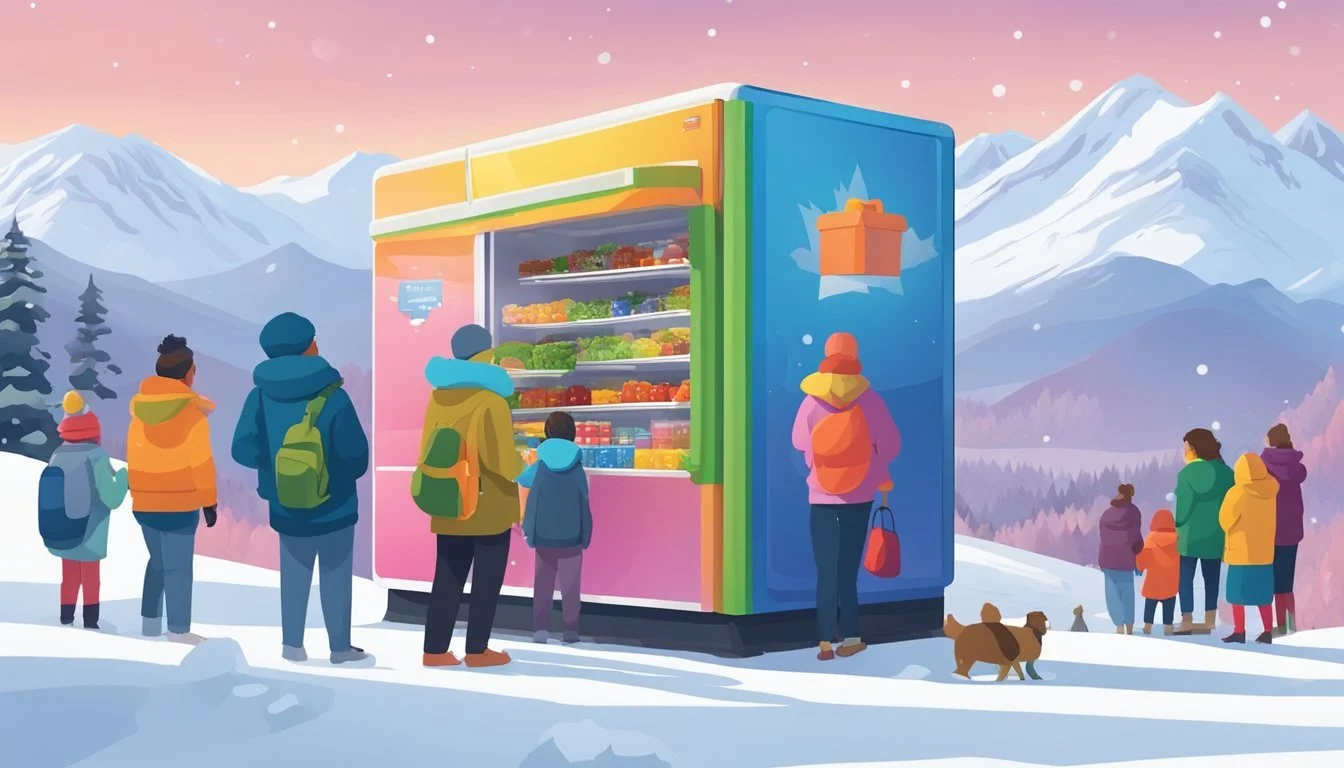Colorado Springs, CO Community Fridge
Bridging the Gap in Food Insecurity
In recent years, Colorado Springs has seen a surge in community support initiatives, and one innovative example is the advent of community fridges. These public refrigerators offer free food for those in need, reflecting a compassionate move towards tackling food insecurity. Strategically placed in accessible locations, community fridges are maintained by volunteers and rely on the generosity of community members and businesses who donate perishable and non-perishable food items.
The concept of a community fridge is simple yet profound: it operates on a take-what-you-need, leave-what-you-can basis, creating a loop of continuous giving. With the cost of living on the rise, such fridges have become a valuable resource in Colorado Springs for individuals and families struggling to make ends meet. Not only do they provide relief to those facing hunger, but they also foster a sense of solidarity and strengthen community bonds.
These fridges are more than just food repositories; they often become hubs of community engagement and social interaction. They are typically adorned with artwork and signage that conveys messages of hope and community spirit. The presence of community fridges in Colorado Springs denotes a city committed to addressing food waste and ensuring that no one has to endure the pangs of hunger in silence.
Concept of Community Fridges
Community fridges are a novel approach to address food insecurity through shared community resources. They highlight the power of local actions in fostering solidarity and supporting those in need.
Defining Community Fridges
A community fridge is a publicly accessible refrigerator where individuals can leave or take food at no cost. It operates on the principle of take what you need, leave what you can, thus creating a sustainable cycle of sharing. Community fridges are typically housed in outdoor spaces, making them easily reachable to individuals in the community.
The Role in Combating Food Insecurity
Community fridges play a crucial role in combating food insecurity by providing access to nutritious food without any stigma or financial barrier. They serve as a grassroots solution to the immediate needs of food deserts—areas that lack access to affordable fruits, vegetables, and whole foods.
Origins and Growth
The concept of community fridges began gaining traction globally and witnessed significant growth in the United States following the onset of the coronavirus pandemic. The economic impact and supply chain disruptions of the pandemic made community fridges an essential resource for many facing uncertainty.
Importance During the Coronavirus Pandemic
During the coronavirus pandemic, community fridges emerged as a vital resource for struggling households. These fridges not only helped mitigate the harsh financial impact faced by many but also served as a testament to community resilience and collective care in times of crisis.
Colorado Springs Community Fridge Locations
In Colorado Springs, community fridges serve as a vital resource for individuals facing food insecurity. The movement provides easy access to free, nutritious food for those in need.
Five Points and Sunnyside
Heart & Hand Center (Five Points)
Location: 2758 Welton St., Denver, CO 80205
Huckleberry Roasters (Sunnyside)
Location: 4301 N. Pecos St., Denver, CO 80211
These locations in the Denver area exemplify the community fridge concept, offering fresh food and fostering a spirit of sharing within the community. Although not located directly in Colorado Springs, the initiative's success in Five Points and Sunnyside showcases the potential for similar schemes in other Colorado communities.
Other Notable Locations
Further locations within Colorado Springs for community fridges have not been specified in the provided search results. Hence, no additional locations can be provided at this time. Individuals looking to access or contribute to a community fridge in Colorado Springs are encouraged to search for local food pantries, community centers, or social service organizations that may provide similar aid and resources.
How Community Fridges Work
Community fridges operate based on a set of clearly defined guidelines, safety measures, and they provide 24/7 access to food for those in need. Each aspect ensures fridges remain a reliable source for communities like Colorado Springs, CO.
Operational Guidelines
Community fridges in Colorado Springs are guided by specific guidelines to ensure their smooth functioning. Volunteers and local organizations typically oversee these refrigerators, maintaining a consistent schedule for stocking and distribution. The main objectives are to reduce food waste and address food insecurity by allowing individuals to take what they need and donate what they can.
Donation Guidelines: Strict donor guidelines are in place to ensure the safety of food items. Acceptable items usually include fresh produce, sealed packaged foods, and non-perishables.
Usage Rules: Users are encouraged to sanitize hands before handling food and to respect quantity limits when taking items, ensuring equitable distribution.
Safety and Maintenance
Safety and cleanliness are crucial for the operation of community fridges. Regular cleaning schedules are observed, and safety checks are performed to ensure the food stored is safe for consumption.
Maintenance Checklist:
Temperature Control: Refrigerators must operate within safe temperature ranges to prevent food spoilage.
Sanitation: Regular cleaning of the fridge interior and exterior is mandatory.
Food Safety Checks: Expired or spoiled items are promptly removed to maintain a safe food supply.
24/7 Access and Usage
The fridges offer 24/7 access, making it a vital resource for individuals who may face food scarcity without time constraints. This round-the-clock availability ensures that community members can access food items regardless of their schedule.
Accessibility: Located in easily accessible areas, often accompanied by clear signage indicating free access.
Community Impact: The 24/7 model not only provides immediate aid to those in need but also fosters a sense of community through shared responsibility and mutual aid.
Donating to Community Fridges
When donating to community fridges in Colorado Springs, CO, it's important to consider the types of items that are most beneficial to those in need. Donors should focus on providing perishable and non-perishable food items that are in good condition, as well as essential non-food items that can support personal hygiene and well-being.
Suitable Food Donations
Community fridges accept a variety of food items, but there are guidelines to ensure food safety and quality:
Perishable foods such as fruits, vegetables, dairy, and cooked meals (how long do cooked meals last?) should be fresh and within their use-by dates.
Non-perishable foods like canned goods, rice, pasta, and cereals should be unopened and undamaged.
Donors from grocery stores or individuals are encouraged to only donate items that they would consume themselves.
Adhering to these guidelines helps maintain high standards and prevents food waste. Here's an example of what to donate:
Perishable Food Non-perishable Food Fresh Fruits and Vegetables Unopened Canned Goods Sealed Dairy Products Rice and Pasta Freshly Made Meals Packed Cereals
Non-food Items and Hygiene Products
In addition to food, community fridges often provide essential non-food items to address other needs:
Hygiene products like soap, toothpaste, and menstrual products are vital for personal care and should be new and unopened.
Diapers are highly appreciated as they are a necessity for families with young children.
Occasionally, art supplies can be donated to inspire creativity among children and adults alike.
Here's a visual guide to non-food donations:
Hygiene Products Others Soap Diapers Toothpaste Art Supplies New Menstrual Products
Local Support and Volunteers
The Colorado Springs community fridge initiative thrives through the efforts of local volunteers and the collective engagement of the community. These volunteers not only contribute to reducing food waste but also bolster the spirit of sharing and caring for neighbors in need.
Community Engagement
Community fridges in Colorado Springs serve as a testament to the strength of community engagement. Local businesses, churches, and residents collaborate to keep these fridges stocked for individuals facing food insecurity. This initiative functions on the principle that everyone is welcome to contribute, be it through donating excess food from their own kitchens or by purchasing items specifically for the fridge. Such partnerships ensure that the community fridge is not just a resource but also a symbol of mutual support.
Volunteer Opportunities
A variety of volunteer opportunities are available for those eager to play a pivotal role in managing the community fridge. The Parks, Recreation and Cultural Services Department offers numerous avenues for involvement:
Clean-up drives: Volunteers can help maintain the cleanliness and hygiene of park areas and trails surrounding the community fridge.
Event participation: Engaging in local events and fundraisers strengthens the cause and brings visibility to the needs of the community.
Food donations: The community encourages food donations at accessible times, with specific locations designated for drop-off at all hours of the day.
Essential training and induction sessions equip volunteers with the necessary knowledge and skills to be both effective and helpful. Volunteers become instrumental in fostering a caring and inclusive environment where everyone has access to nutritional food.
Collaborations and Partnerships
Collaborations and partnerships are vital components of the Colorado Springs Community Fridge initiative. They harness the collective efforts of various local entities to support and sustain this community project, aiming to address food insecurity and promote food equity.
Restaurants and Bars Participation
Restaurants and bars in Colorado Springs contribute to the community fridge by providing surplus food, ensuring that it is put to good use rather than wasted. They play an essential role by offering fresh produce and meals that might otherwise be inaccessible to those in need. Through philanthropic involvement, these establishments demonstrate social responsibility and community engagement.
Participation examples:
Donating surplus fruits and vegetables.
Providing prepared meals nearing the 'Best By' date.
Local Businesses and Nonprofits
Local businesses and nonprofits form the backbone of the community fridge network, by facilitating the redistribution of over $6 million of healthy groceries since 2013. They bring forth resources, volunteers, and logistical support to operate the fridges efficiently.
Support roles:
Nonprofits: Coordinate efforts and manage food distribution.
Businesses: Sponsor fridges and donate essential supplies.
By working together, these diverse partners turn the vision of a food-equitable community into a tangible reality.
Impact on Special Populations
Community refrigerators in Colorado Springs, like those that form part of the community fridge movement, serve as a beacon of relief for special populations experiencing food insecurity. These refrigerators provide an accessible source of free, nutritious food, mitigating hunger among the most vulnerable.
Youth and Families
Community fridges have a particular significance for youth and families in Colorado Springs, as food insecurity can severely impact children's health and development. Access to a community fridge allows for:
Consistent nutrition: Helps in ensuring that children have regular access to healthy foods, crucial for proper growth and academic performance.
Alleviation of parental stress: Reduces the burden on parents who struggle to provide for their children's dietary needs, contributing to a more stable home environment.
Persons with Disabilities
For persons with disabilities, community refrigerators are more than just a source of food. They represent:
Increased independence: Allows individuals with disabilities to obtain food without the need for complex logistics or assistance.
Accessible nutrition: Provides an opportunity for those facing physical or financial barriers to access nutritious food options that may otherwise be out of reach.
Promotion and Awareness
Successfully promoting the Colorado Springs, CO Community Fridge is essential to ensure its continual use and support. Through a focused social media strategy and dedicated community outreach programs, awareness can be effectively raised among both potential donors and those in need.
Social Media Strategy
The Colorado Springs Community Fridge utilizes Instagram as a vital platform to reach a broad audience. They:
Post regularly about the fridge’s location, available items, and donation needs.
Engage with local users by sharing their experiences and reposting stories of those who have benefited from the fridge.
Utilize hashtags like #ColoradoSpringsCommunityFridge and #FeedColoradoSprings for enhanced discoverability.
Community Outreach Programs
They partner with:
Local businesses to host events and set up donation points.
Nonprofits and food banks to coordinate supplies and assist with a diverse set of needs.
The community fridge organizers hold:
Workshops to educate the community about food insecurity and the role of community fridges.
Frequently Asked Questions
In this section, readers can find key information on how to become part of the Community Fridge initiative in Colorado Springs, CO, and how to locate a community fridge nearby.
How to Get Involved
Individuals and families wanting to contribute to the community fridge movement have several options. They can donate food, assist with fridge maintenance, or even start a new fridge. To ensure food safety and meet community needs, it is recommended to follow these guidelines:
Food Donation Recommendations:
Nonperishable goods: Rice, canned vegetables, pasta.
Perishable goods: Fresh fruits and vegetables (ensure they're in good condition).
Prohibited items: Alcohol, raw meat, opened or homemade items are typically not accepted.
Volunteering:
Maintenance: Cleaning and organizing the fridge.
Donation pickup and delivery to the fridge site.
Finding the Nearest Fridge
Community fridges are located across various neighborhoods to provide easy access to families and individuals in need. To find the nearest community fridge:
Check Online: Visit local community resource websites or social media groups for up-to-date locations.
Local Outreach: Often, local nonprofits or community centers can direct people to the closest fridge.
By following these easy steps, individuals can support or benefit from the Community Fridge in Colorado Springs, ensuring that those in need receive assistance in a dignified and accessible manner.
Future Prospects
The progression of community fridges in Colorado Springs symbolizes advancing support for local communities and a growing commitment to food security. These efforts aim to bridge gaps in food availability and foster communal sharing, particularly for those in housing need.
Expansion to New Areas
Community fridges, initiated by local organizations and individuals, are anticipated to spread to new neighborhoods in Colorado Springs. This effort mirrors actions seen in the Denver Community Fridges project. The expansion strategy includes:
Identification of neighborhoods with limited access to food resources.
Collaboration with local businesses and property owners to secure accessible and visible locations.
Engagement with the community to ensure local needs and preferences are met.
By extending the reach, Colorado Springs underscores its dedication to inclusivity and ensuring no resident faces food scarcity.
Sustainability and Long-term Goals
Key to the success of community fridges is the establishment of a self-sustaining system that addresses the immediate needs while maintaining a vision for the future. Objectives include:
Reducing food waste through community partnerships.
Creating educational programs about sustainable food practices and healthy eating habits.
The implementation of eco-friendly refrigeration technology and renewable energy sources to lower environmental impact.
The focus on sustainability reflects a holistic approach to community support, prioritizing both human and environmental well-being in Colorado Springs' efforts. Additionally, integrating community fridges into affordable housing initiatives may offer a unique opportunity to aid residents further and solidify the program as a cornerstone of local support systems.




